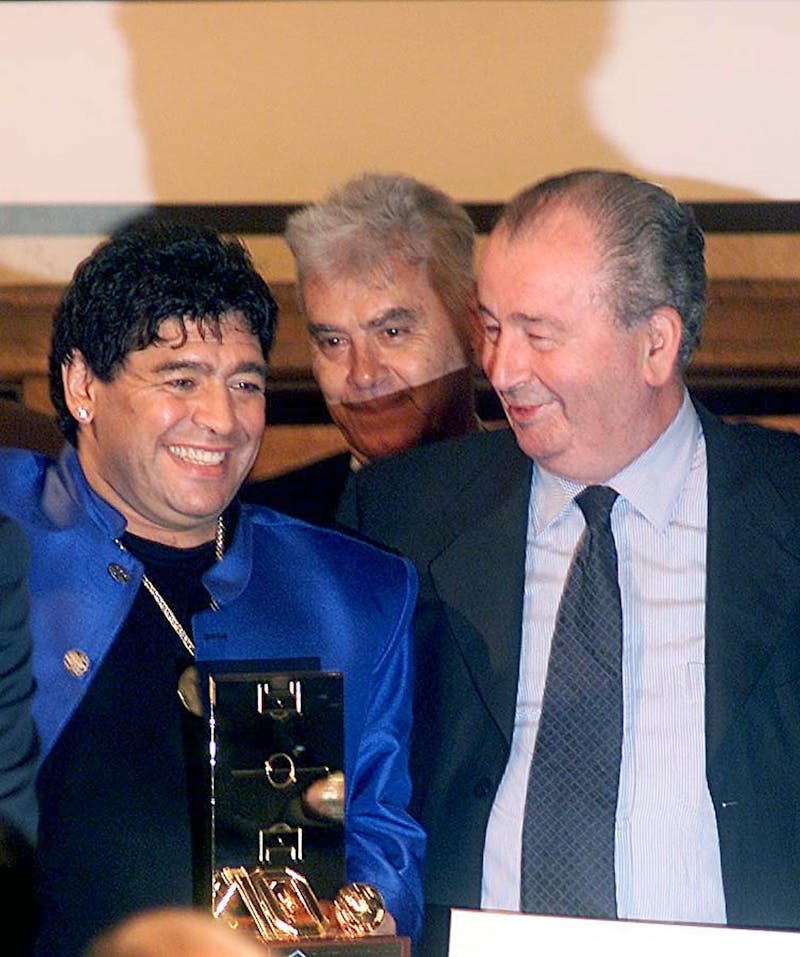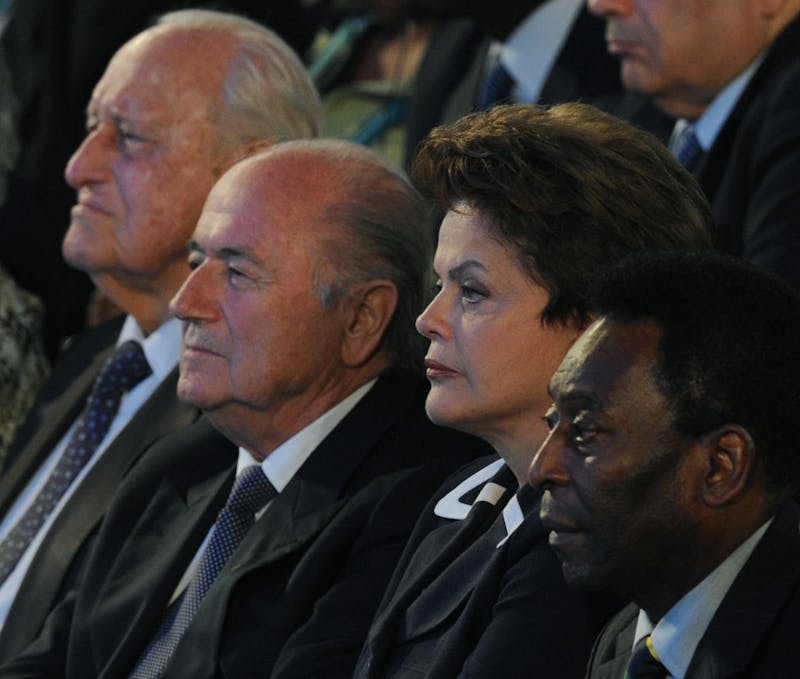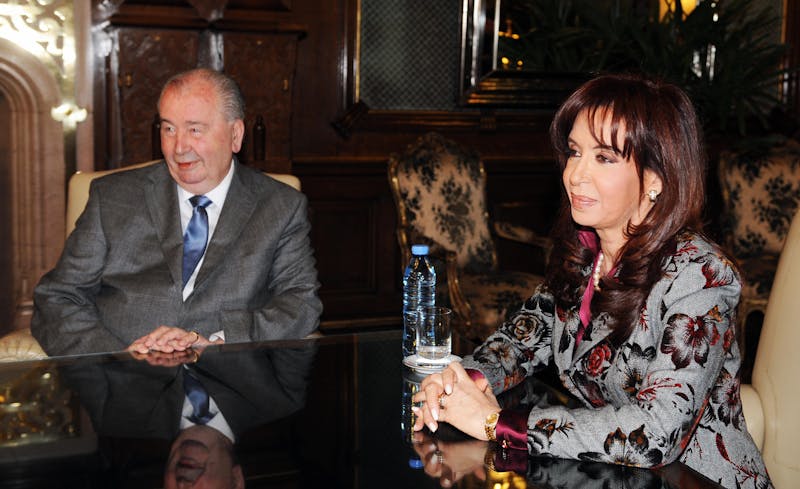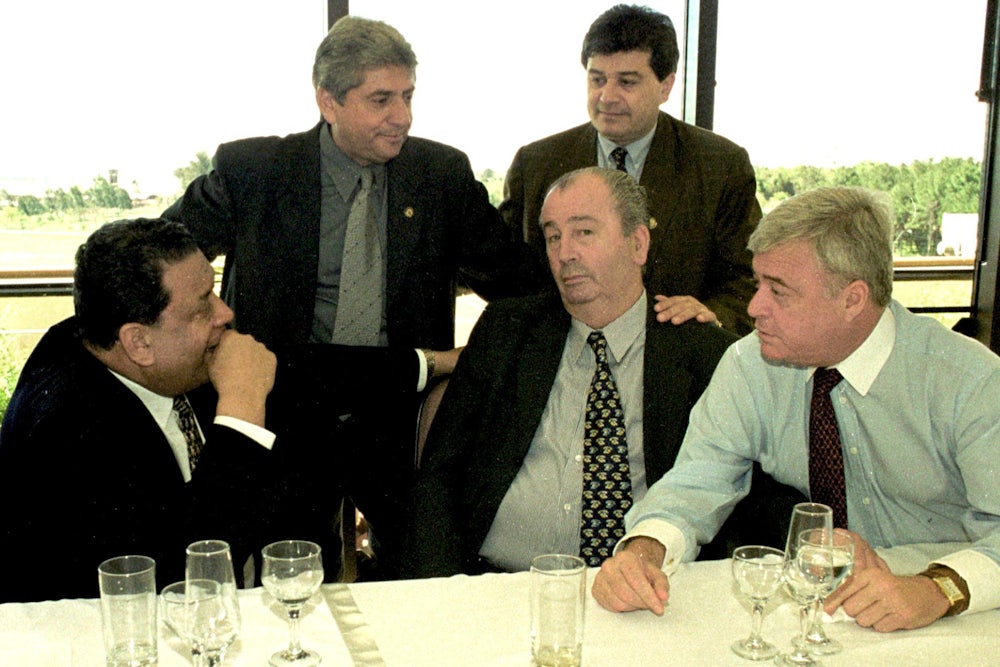Toward the end of the 2010 World Cup, Julio Grondona made a prediction, or perhaps it was a promise, to a group of journalists in the gilded lobby of Johannesburg’s Michelangelo hotel, the five-star Italian-marble palace where FIFA, soccer’s international governing body, had established its tournament headquarters. Argentina had just been humiliated, 4-0, by the Germans, but Grondona wasn’t worried about the backlash. In 31 years as president of the Argentina’s national soccer association, he’d endured personal scandal, government turmoil, economic collapse, and the ardent passions of the beautiful game’s fans. “Todo Pasa,” read the inscription on his big gold ring. All things pass—all things except, of course, Julio Grondona. “No one is kicking me out until I die,” he told the reporters.
Sure enough, Grondona, at the age of 82, was still the association president when he succumbed to an aneurysm in July 2014, nine months before the U.S. Department of Justice issued the first in a series of indictments placing him (“Co-Conspirator #1”) at the center of a vast criminal network that distributed “well over $200 million” in bribes and soccer licensing kickbacks. Alejandro Burzaco, an Argentine sports marketing executive who forfeited $21.7 million as part of a cooperation agreement with the U.S. government, testified in a Brooklyn federal court last month that negotiations over the media rights to Copa America, the quadrennial South American tournament, took place in Grondona’s room at the Michelangelo.
His signature alone cost $3 million, and Grondona expected equivalent installments each time the tournament was held. He preferred cash—up to $1.2 million a pop by the end—for Copa Libertadores, the continent’s premier annual club competition; for Argentina qualifiers and friendlies; and for fielding Argentina’s best talent, who otherwise might sit international matches out. (Lionel Messi, who attended Grondona’s funeral, allegedly received $200,000 per game, to share with his teammates as he saw fit.) But when it came to the Latin America rights for the 2026 and 2030 World Cups, Grondona asked Burzaco and his partners at Brazil’s TV Globo and Mexico’s Televisa to wire a $15 million payment to Switzerland.
Diego Maradona once noted that Grondona, with his jowly smirk, grey slickback, and great round belly, “sometimes comes off like a mafioso.” That’s certainly true of this trial, which went to jury deliberations Thursday night and which has had, as Bloomberg’s Patricia Hurtado writes, all “the trappings of a grisly organized-crime prosecution.” (One of the defendants allegedly directed throat-slashing gestures at a seated witness.) Luis Bedoya, a former president of Colombia’s soccer federation, recalled being summoned to discuss illegal payments in the cramped back office of a gas station Grondona owned in the Buenos Aires suburb where he grew up. When one of Grondona’s alleged co-conspirators on the FIFA executive committee pushed for Japan to host the 2022 World Cup, Grondona, who had received at least $1 million to support Qatar’s eventually successful bid, accosted him in the bathroom between votes.
“There are written rules and there are invisible codes,” Burzaco testified, “and Julio Grondona was mainly concerned with people respecting those invisible, not written codes.” The senior vice president of FIFA and chairman of its finance and media committees, Grondona “knew everything” about everyone, said Burzaco. He had “the last word in the sense of authorizing, giving a green light, to each single payment of bribes. We would run subjects through him, and he would authorize, consider their relative amount of the bribe to one against the other, or sometimes he would keep part of the bribe of someone if he thought he was receiving too much.”
Of the more than 40 soccer officials and sports marketers indicted by the Department of Justice—many of whom have already pled guilty—30 are from Latin America, including all three defendants on trial in Brooklyn. That’s partly a function of geography, and the way the FBI’s investigation branched out from the $6,000-a-month Trump Tower apartment one U.S. soccer official rented out for his cats. But it would be wrong to assume that Julio Grondona is just another gangster with a lifetime supply of Adidas merchandise, or that the specific corruption on display this past month could simply be mapped onto another region. “FIFA,” says David Goldblatt, a soccer historian who currently teaches at Pitzer College, “is the most Latin American organization in global politics.”
Secretary of State Henry Kissinger opened the meeting in which he would bless a political crackdown in Argentina with a few light-hearted quips about soccer. Kissinger was attending the 1976 Organization of American States General Assembly in Chile, where he had, a few years earlier, helped orchestrate a coup d’etat. In March of 1976, Argentina, the last democratic holdout in the Southern Cone, had fallen to the military. Two days after the takeover, FIFA President Joao Havelange, who enjoyed a close working relationship with the military rulers of his native Brazil, heralded the new government, saying that Argentina was “now more ready than ever” to host the upcoming World Cup in 1978.
Kissinger, too, seemed enthusiastic about the tournament’s prospects. “No matter what happens, I will be in Argentina in 1978,” he assured a delegation from the country’s new dictatorship. “Argentina will win.” Kissinger’s counterpart, a navy admiral, expressed doubts. “If you can control an Argentine crowd when Argentina loses,” joked Kissinger, “then you can say you have really solved your security problem.” The rest of their conversation, transcribed in a declassified memorandum obtained by the National Security Archive, has been remembered primarily because of what Kissinger told the Argentines: that “if there are things that have to be done, you should do them quickly.” But what the Argentines told Kissinger is just as significant. “The terrorist problem is general to the entire Southern Cone,” said Foreign Minister Cesar Guzzetti. “To combat it, we are encouraging joint efforts to integrate with our neighbors.”
That may have been the first time anyone informed Kissinger about Operation Condor, the transnational surveillance, rendition, torture, and assassination program the South American dictatorships developed to track and target dissidents beyond their own individual borders. At the time, George H.W. Bush’s Central Intelligence Agency was monitoring the program—and its paid assets’ involvement therein—while the Condor states coordinated through a U.S. military communications system located in the Panama Canal Zone. And once Kissinger had been made demonstrably aware of Condor’s activities, the celebrated statesman would continue to signal his approval to the generals. Two weeks after the September 1976 car-bombing of former Chilean ambassador Orlando Letelier in Washington, D.C.—a Condor mission directly ordered by Chilean dictator Augusto Pinochet—Kissinger met again with Argentine Foreign Minister Guzzetti in New York. “Look, our basic attitude is that we would like you to succeed,” said Kissinger, reiterating that “the quicker you succeed, the better.”

Kissinger’s support for the dirty wars did not end with his term in office in 1977. True to his word, he attended the 1978 World Cup as an honored guest of the dictatorship. According to a recently released batch of declassified State Department documents, the trip was something of a private diplomatic tour, with Kissinger taking official meetings, posing for photo-ops, and generally working to undermine Jimmy Carter’s “romantic” concerns over human rights. Held under the slogan “We Argentines are right and human,” the entire tournament served as a public relations spectacle for the embattled regime. In addition to the bulldozer slum clearances and egregious public-works graft now synonymous with athletic mega-events, the forced disappearance and grotesque torment of regime opponents redoubled throughout the preparations—and indeed, continued during the tournament. Considerable evidence suggests Argentina’s decisive 6-0 second-round victory over Peru was fixed by the two Condor governments. But in the end, Argentina lifted the trophy—as Kissinger had predicted—in a triumphant final victory over the Netherlands. At a banquet put on by the government the following night, FIFA President Havelange rose a glass to his elated hosts. “Now,” he said, “the world has seen the true face of Argentina.”
Havelange was so pleased with the tournament that he awarded its planner, newly promoted Navy Vice Admiral Carlos Alberto Lacoste, a fast-tracked vice presidency at FIFA. Lacoste became an instrumental ally to Havelange, who fought to prevent Lacoste from being investigated for murder and mass embezzlement once Argentina transitioned back to civilian rule. When Lacoste at last stepped down in 1984, Havelange gave his position to Julio Grondona, the man Lacoste had tapped to run the Argentine soccer association in his absence.
Havelange had campaigned for the FIFA presidency four years earlier on a forward-thinking Third World solidarity platform, jetting across Africa and Asia with cash-stuffed envelopes and promises of inclusive development. Whenever possible, he also brought Pele, the game’s greatest, and most marketable, player. In How They Stole the Game, journalist David Yallop speculates as to where Havelange could have found the budget for such an extensive itinerary. There were the shady deals Havelange, a weapons dealer, had conducted with figures like Bolivian dictator Hugo Banzer. There was also the large, unexplained hole Havelange left in the finances of the Brazilian soccer federation, of which he was the longtime president under military rule. Andrew Jennings reports in Foul! The Secret World of FIFA that Adidas owner Horst Dassler started throwing cash around wildly once it became apparent that Havelange’s gambit might work.
However he pulled off his election, Havelange reached the presidency loaded with debts. He had vowed to expand the World Cup bracket—a mission that Lacoste would later help realize—but the immediate priority was to keep his coalition of smaller, poorer federations intact. For that, Havelange needed money, and for that, he turned to Adidas. Dassler shared Havelange’s ambitions for FIFA and the commercial reach of its product. And together with upstart ad wizard Patrick Nally, he took it upon himself to sell other blue-chip sponsors on that vision: Canon, Gillette, and the big get, Coca-Cola.
The beverage giant agreed to fund Havelange’s new soccer “development” program—which is where, in 1975, future president Sepp Blatter launched his career at FIFA—and to underwrite the exorbitant costs of the 1978 World Cup. But it was the first-of-its-kind exclusivity agreement that transformed soccer into a truly modern global commodity. By segmenting the footballing experience into discrete categories of consumption, FIFA could attract brands commensurate with the multinational scope of its own. “Never, in the history of sponsorship,” boasts West Nally, the ad firm Patrick Nally went on to cofound after a split with Dassler, “has one company obtained so much exposure and promotional benefits from a single sporting involvement, at such reasonable cost.”
The success of the Argentina experiment allowed Havelange to reinvest licensing revenues in the tournament, fulfilling a crucial campaign promise to expand the field for 1982. The following year, Dassler launched International Sports and Leisure (ISL), a functional prototype of the sports marketing firms indicted by the DOJ. With an office right across the street from FIFA’s Zurich headquarters, the company would sell TV and sponsorship rights on FIFA’s behalf, channelling tens of millions of francs in bribes and kickbacks to Havelange; his son-in-law Ricardo Teixeira, president of the Brazilian federation; and Nicolas Leoz, the president of CONMEBOL, South America’s soccer governing body. As long as the game kept growing, it didn’t matter how competitive the contracts were—and when ISL collapsed in 2002, it became clear that they weren’t. Havelange could keep bringing new member states to the table and buying loyalty both above and below it.
With Grondona in charge of FIFA finances, Blatter elevated that ad hoc bagman-politicking into a sophisticated corporate machinery of shameless self-perpetuation. But it was during the 1978 World Cup that Havelange consolidated the basic nexus of patronage politics and corporate corruption exposed by the Department of Justice.
On the poster-board pyramid charts the prosecution likes to show the jury, Grondona’s face gets velcroed onto the highest rung, next to those of his fellow FIFA executive committee members Ricardo Teixeira and Nicolas Leoz. They were the true powers in South American soccer: Grondona, because of his decision-making prowess at FIFA; Teixeira, because of the prestige of joga bonito and his influence with Globo TV and the lucrative Brazilian market; and Leoz, who secured a diplomatic immunity carveout for CONMEBOL’s headquarters in Asuncion, the Paraguayan capital, thanks to what Burzaco, the Department of Justice’s witness, referred to as his “strong links with the Paraguayan government.”

For much of Leoz’s career, that government belonged almost exclusively to Alfredo Stroessner. Leoz was president of the dictator’s favorite team, Libertad, which had gone 21 seasons since last winning the league. Then in 1976, Leoz turned the team over to Fredy Stroessner, Alfredo’s son. Libertad were crowned champions that very season.
Many of the Central American and Caribbean officials on the indictment list came up through the Havelange political apparatus. Trinidad’s Jack Warner, the former president of CONCACAF, worked diligently to assemble the small-island voting bloc that Blatter and Grondona would integrate into their political base and bribe network. Jeffrey Webb, the former banker and CONCACAF vice president, served as Grondona’s deputy on the FIFA finance committee.
But a remarkable cross-section of prominent DOJ targets have connections, both alleged or proven, to the U.S.-backed dirty wars in Latin America. In 2013, Sao Paolo’s Folha newspaper reported that, in the early years of Brazilian dictatorship, Marco Polo del Nero—who resigned from CONMEBOL and FIFA, but has stayed on as Brazil’s federation president—participated in the paramilitary extremist group Command of Communist Hunting. Del Nero and several allies responded to the report by lashing out at the journalist, but did not deny the specific claim. Alfredo Hawit—a former CONCACAF president, FIFA vice president, and FIFA executive committee member—appears in a 1993 state-sponsored human rights report on Honduras, which accuses him of collaborating in unspecified forced disappearances with General Gustavo Alvarez Martinez, the point man for CIA and Argentina intelligence operatives attempting to replicate Operation Condor in Central America. Hector Trujillo, the former Guatemalan magistrate and soccer federation general secretary, sat on the heavily criticized tribunal that overturned the genocide conviction of General Efrain Rios Montt.
In 2014, the left-leaning president of the Peruvian Congress claimed that Manuel Burga, one of the defendants on trial in Brooklyn, was “placed and designated” the Peruvian federation’s president by imprisoned dictator Alberto Fujimori. Another defendant, former CONMEBOL president Juan Angel Napout, inherited a business empire from his father, who accumulated exclusive import licenses through a close friendship with Alfredo Stroessner. The third, Jose Maria Marin, was a legislator and governor with the pro-military ARENA party in Sao Paolo before heading the state’s formidable soccer federation. In 1976, he took to the floor of the assembly, demanding the local government investigate TV Cultura, a free local station, for fomenting “great unrest.” Fifteen days later, Sao Paolo police abducted Vladimir Herzog, the leftist editor-in-chief, and tortured him to death.
The era of market liberalization that coincided with democratic transition in the 1990s only deepened the culture of institutionalized corruption that had developed around soccer in the Americas. Alejandro Burzaco, who testified to paying tens of millions in bribes, made his fortune acquiring media and telecommunications assets during the orgy of insider privatization in early 90s Argentina. Former Honduran President Rafael Callejas, who pled guilty for taking bribes as president of the national soccer federation, pursued a similar agenda of financialization and state service reduction in his country. Luis Chiriboga, the former Ecuadorian federation president, was running Deportivo Quito when he was elected city councilman on a neoliberal Christian Social Democrat ticket in 1992. Paraguayan President Horacio Cartes, an almost comically criminal businessman who campaigned with Alfredo Stroessner’s Colorado Party and has defended the dictator’s legacy since entering office, took over as president of Stroessner’s Club Libertad in 2001 and named its remodeled stadium after Nicolas Leoz, the soon-to-be-extradited former CONMEBOL president. According to Whatsapp messages introduced as evidence in the trial in Brooklyn, Juan Angel Napout traded World Cup tickets for political favors from Cartes and other Paraguayan officials.

Cartes has been held up as an example of the right-wing’s resurgence in Latin America, following a period of widespread social democracy. But what’s lost in this narrative is the extent to which the leaders of the so-called Pink Tide internalized the logic of the post-Cold War governing consensus. Revolution and class war gave way to reform, progress, and growth, to a willingness to work with and within the system. As Bernardo Vasquez and Dadid Cayon write in Futbol Para Todos, Julio Grondona “never before managed to establish such a well-oiled association with the government as the one he constructed” with Argentina’s Cristina Fernandez Kirchner—whose replacement, Mauricio Macri, has been subject to various scandals stemming from his tenure as club president of Boca Juniors. In Brazil, enthusiasm for the World Cup brought President Dilma Rousseff into partnership with Jose Maria Marin, an outspoken advocate for the dictatorship that tortured her.
It’s easy to oversimplify a complex, country-specific political process, but one recurring theme in the decline of the elected Latin American left is its acceptance of, and often complicity with, corruption and reactionary power. When Rousseff met FIFA Order of Merit recipient Henry Kissinger in New York in 2015, she called him “a fantastic person, with a grand global vision.”
As he processed the news that police had hauled off a group of officials from FIFA’s 2015 Congress in Zurich, Argentine sports reporter Sebastian Fest was surprised to find himself thinking, “God bless America.” “The extraterritoriality of U.S. justice disquiets many,” he conceded, but Uncle Sam had at last accomplished what “decades of lamentations and more or less spineless efforts” by Europeans couldn’t. “While we may question the role of the United States as a global watchdog in many respects,” a Swiss soccer scholar told The New York Times soon after, “this is one instance in which the extraordinary power of the Justice Department is working in ways that benefit the world at large.”
The FIFA corruption scandal, then, has been framed as an exception to the United States’s long history of disastrous foreign intervention. But there’s a sense in which cleaning up the mess of past intervention also serves to reinforce the rule. “They were trying to send a message to the world,” says Wayne State University law professor Peter Henning, an expert in the Racketeer Influenced and Corrupt Organizations (RICO) law being deployed in this case. RICO, Henning told me, is “flexible statute, very expansive.” Created to dismantle the mafia, it’s been applied in various contexts, but not, for the most part, to prosecute corporations or financial houses. The decision to invoke it against members of FIFA, Henning says, may stem as much from the Department of Justice’s internal politics as the facts of the case itself. FIFA has no constituency in the United States, besides the pool of sponsors now inching away from its scandals. It doesn’t employ lobbyists in Washington, and it doesn’t invest in think tanks and academic endowments. “This case can become a template for how to pursue international corruption,” says Henning. But it came to fruition because “they were picking out a target that couldn’t defend itself.”
It’s unclear whether the FIFA case signals a broader change in strategy for the Department of Justice, which has been criticized for its reluctance to hold corporate America accountable for criminal wrongdoing. And it’s unclear whether it will even signal a change at FIFA. In 2015, two days after the indictments hit, FIFA named CONMEBOL finance committee member Cristian Varela, a close ally of convicted Chilean federation president Sergio Jadue, to its disciplinary committee. A “Chicago Boys” economist and one-time social companion of Augusto Pinochet’s daughter, Varela has been accused of corrupt dealings relating to the TV equipment and production company he owns, which was privatized in the latter days of the dictatorship and does business with CONMEBOL. Earlier this year, FIFA appointed CONMEBOL president Alejandro Dominguez to occupy Grondona’s former seat on the finance committee. Alejandro is the son of Oswaldo Dominguez Dibb, a wealthy, allegedly criminal businessman, the former president of Club Olimpia, a one-time candidate for president from Alfredo Stroessner’s Colorado Party, and the brother of Stroessner’s son-in-law. In testimony last month, Alejandro Burzaco said that Dominguez’s predecessor Juan Angel Napout asked for bribes on his behalf. Dominguez, explained Napout, was not a very successful businessman.
